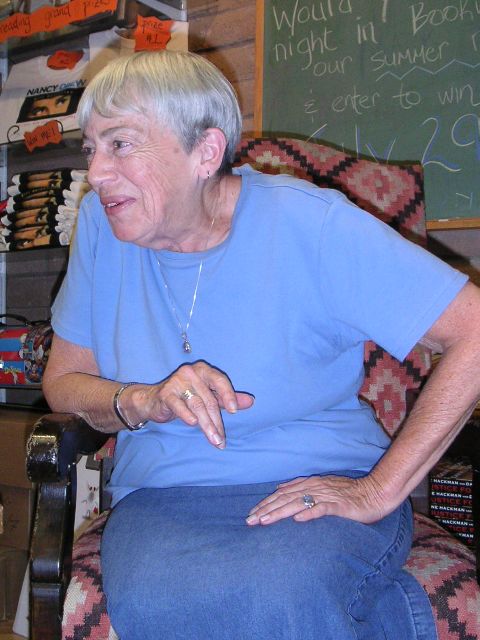It was 1989, and I was twelve.

Ursula at a bookstore Q&A, New Mexico, 2004.
I can still smell the dust that coated that corner of the classroom–the corner that served as the reading nook, a corner few (other than me) ventured into voluntarily. Yet that corner was a home to me as we read A Bridge to Terabithia and other books my 6th grade year. It was also the year I picked up A Wizard of Earthsea by Ursula K. Le Guin by complete accident and fell madly and deeply in love with this fantasy world, and then so many others as I discovered the world of fantasy. It was the first (though not the last!) book that kept me up late into the early morning reading. That series enraptured me in the way that it did so many children, but it wasn’t until later in life that I discovered Ursula the Feminist, Ursula the Poet, and Ursula the Teacher.
She gave back to the writing community until the very end, teaching at numerous writing workshops and conventions, and gave countless advice to those starting out on the career of writing fiction.
She understood what it was to, not just be a writer but a reader as well. She understood the way a creation has more than one creator and how our words impact more than just those directly around us.
As you read a book word by word and page by page, you participate in its creation, just as a cellist playing a Bach suite participates, note by note, in the creation, the coming-to-be, the existence, of the music. And, as you read and re-read, the book of course participates in the creation of you, your thoughts and feelings, the size and temper of your soul.”
She was a master of words and a wanderer through genres as she crafted work after work and spoke to the younger writers aspiring to be her. John Scalzi said it best in his tribute to her in the Los Angeles Times:
The speaking of her name and of her words goes on, and will go on, today and tomorrow and for a very long time now. As it should. She was the mother of so many of us, and you should take time to mourn your mother.”
I attended the SFWA reading last night to hear several friends read and while a room full of writers mourned the loss of such a giant in the genre, I was reminded of the caring nature and warmth of my SFF family. It’s this warmth that lights even the darkest of days. It’s how we persevere when the world around us eats itself.
There are many authors who have had a hand in the creation of me as an early author, but Ursula Le Guin’s hand was a guiding force throughout my career thus far, and I’m sure she will be for many years to come.
She will greatly be missed.
Long ago when I was Ursula
writing, but not “the writer,”
and not very plural yet,
and worked with the owls not the sparrows,
being young, scribbling at midnight:I came to a place
I couldn’t see well in the darkness,
where the road turned
and divided, it seemed like,
going different ways,
I was lost.I didn’t know which way.
It looked like one roadsign said To Town
and the other didn’t say anything.So I took the way that didn’t say.
I followed
myself.
“I don’t care,” I said,
terrified.
“I don’t care if nobody ever reads it!
I’m going this way.”And I found myself
in the dark forest, in silence.You maybe have to find yourself,
yourselves,
in the dark forest.
Anyhow, I did then. And still now,
always. At the bad time.When you find the hidden catch
in the secret drawer
behind the false panel
inside the concealed compartment
in the desk in the attic
of the house in the dark forest,
and press the spring firmly,
a door flies open to reveal
a bundle of old letters,
and in one of them
is a map
of the forest
that you drew yourself
before you ever went there.The Writer At Her Work:
I see her walking
on a path through a pathless forest,
or a maze, a labyrinth.
As she walks she spins,
and the fine thread falls behind her
following her way,
telling
where she is going,
where she has gone.
Teling the story.
The line, the thread of voice,
the sentences saying the way.The Writer On Her Work:
I see her, too, I see her
lying on it.
Lying, in the morning early,
rather uncomfortable.
Trying to convince herself
that it’s a bed of roses,
a bed of laurels,
or an innerspring mattress,
or anyhow a futon.
But she keeps twitching.There’s a *lump*, she says.
There’s something
Like a *rock*—like a *lentil*—
I can’t sleep.There’s something
the size of a split pea
that I haven’t written.
that I haven’t written right.
I can’t sleep.She gets up
and writes it.
Her work
is never done.—Ursula K. Le Guin, from “The Writer on, and at, Her Work”


